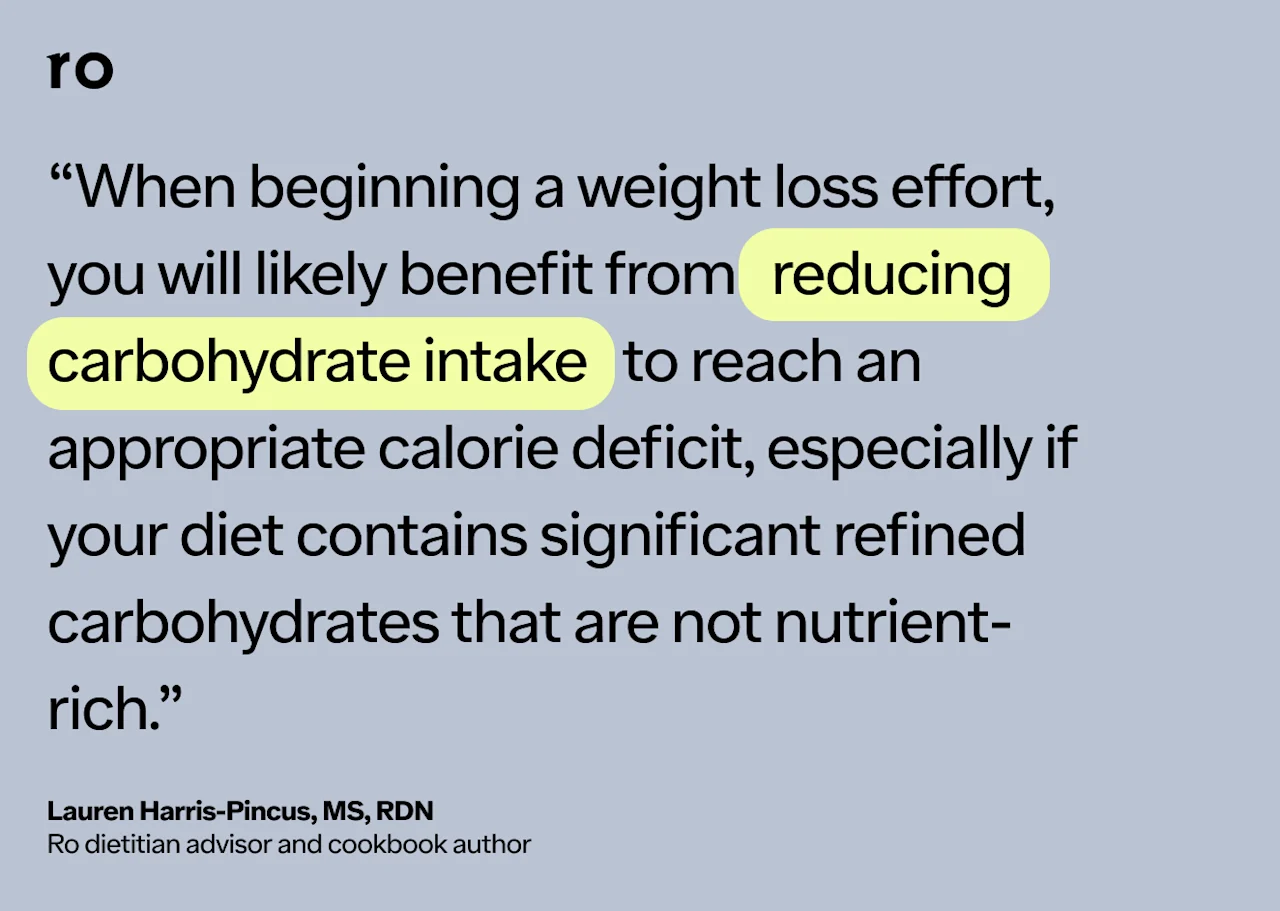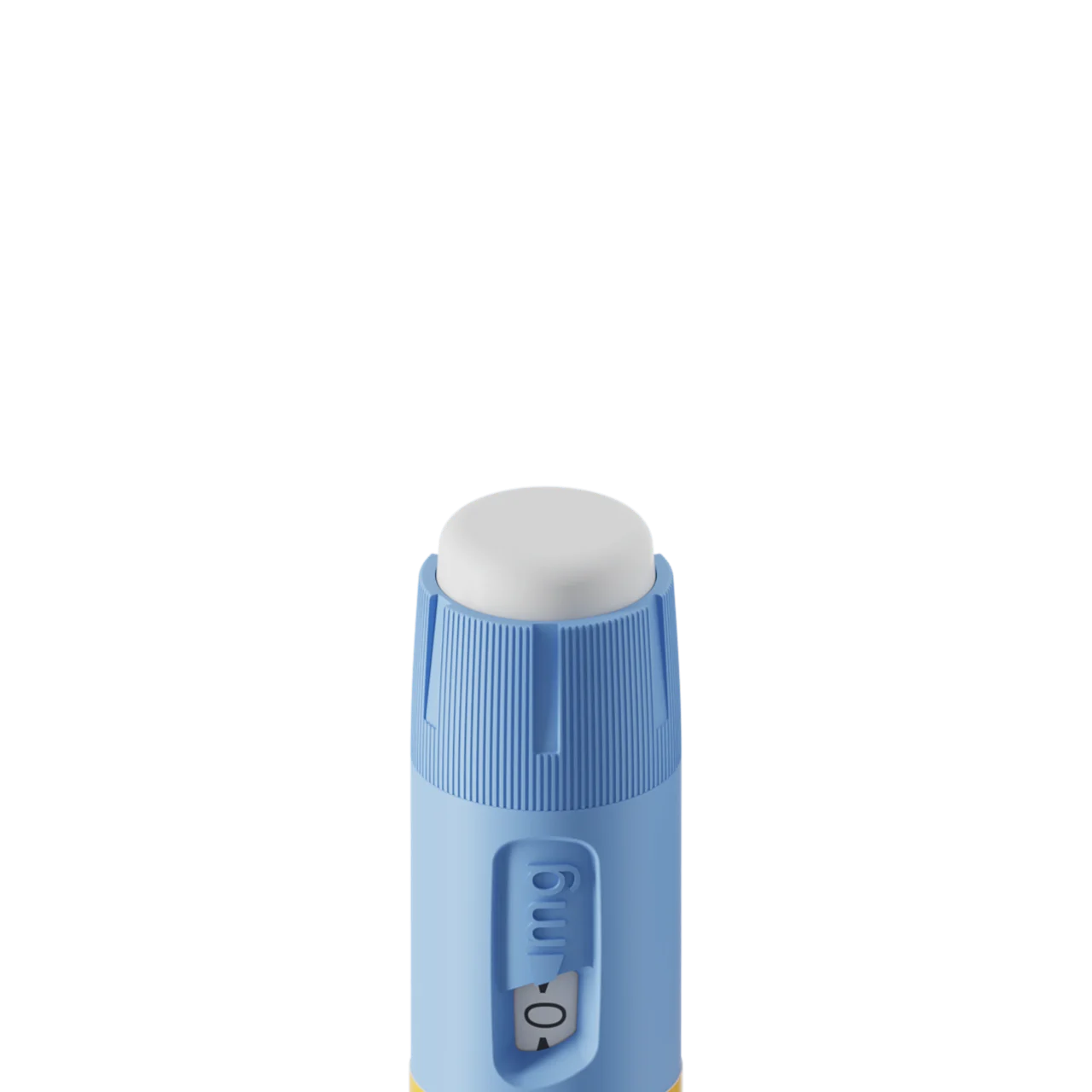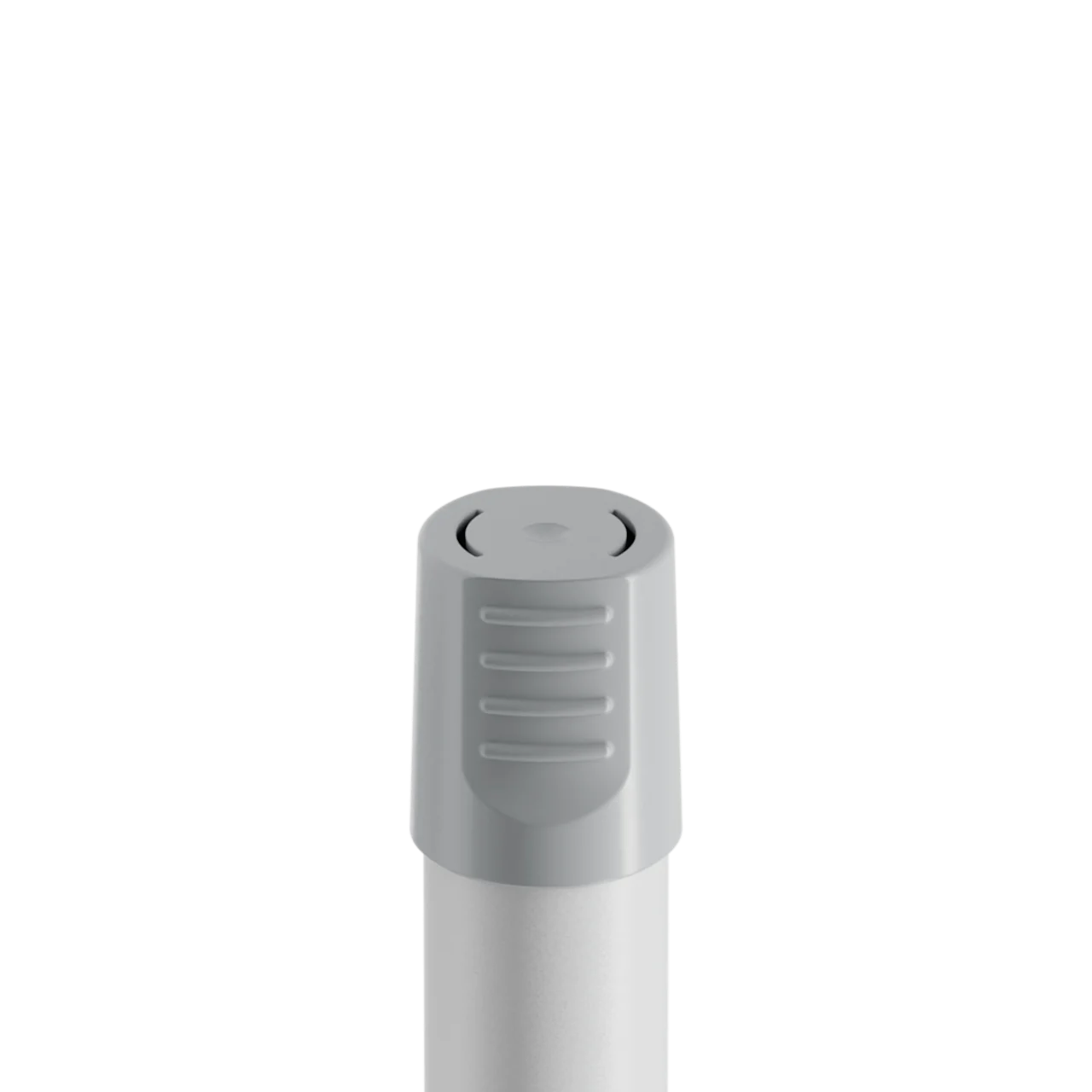Key takeaways
The ideal daily carb intake for weight loss depends on many factors such as your age, current weight, and medical conditions.
While eating less carbs can promote weight loss, it’s also important to focus on fiber-rich sources of carbs, which will make you feel full and eat less calories overall.
Here's what we'll cover
Here's what we'll cover
Here's what we'll cover
Key takeaways
The ideal daily carb intake for weight loss depends on many factors such as your age, current weight, and medical conditions.
While eating less carbs can promote weight loss, it’s also important to focus on fiber-rich sources of carbs, which will make you feel full and eat less calories overall.
Few statements are universal, but most would agree that carbohydrates are delicious. When it comes to weight loss, though, carbs are often (wrongly) considered the enemy. Not only are they your body’s main energy source, but they can also help you shed pounds and belly fat—when consumed wisely. So, how many carbs should you eat per day to lose weight? The answer depends on your age, sex, current weight, and activity level, among other factors.
Let’s explore how carbohydrates can fit into your weight loss diet, including how to determine the amount of carbohydrates you need and the pros and cons of reducing carbs to meet your goals.
How many carbs should you eat to lose weight?
First thing’s first: The amount of carbs you should eat depends on personal factors, including your age, sex, weight, physical activity, and medical conditions. This is true even if you’re not trying to lose weight.
Additionally, according to the current US Department of Agriculture (USDA) Dietary Guidelines for Americans, 45%–65% of your total daily calorie intake should come from carbohydrates, regardless of your total calorie consumption, age, and sex.
Want something more specific? Per the US Food and Drug Administration (FDA), the daily value for total carbohydrates is about 275 grams per day when following a 2,000-calorie daily diet (which, BTW, is the general benchmark used on nutrition labels). However, being that your daily calorie intake also depends on individual factors, you can see how your recommended carb intake may be more or less than that number.
If you are trying to lose weight, you may consider cutting down your carbohydrate consumption as part of reducing your overall calories. Commonly, the thinking is that if you eat fewer carbs, you’ll be more likely to include more fat and protein on your plate. This can boost satiety and help you eat less, leading to weight loss.
But again, since many factors influence calorie needs, there’s no single recommendation for how many carbs to eat per day to lose weight.
How to calculate how many carbohydrates you need
Figuring out how many carbs you may need per day to lose weight is a multi-step process. The amount, however, is largely based on your caloric intake.
Step one: determine how many calories you need. If you’d like to calculate how many carbs you need to lose weight, the first step is to determine your daily calorie requirement based on your height, weight, age, and activity level, according to Lauren Harris-Pincus, MS, RDN, Ro Dietitian Advisor and cookbook author. In other words, you need to figure out your total daily energy expenditure (TDEE), which represents the number of calories your body burns daily. “You can use an equation such as the Mifflin-St. Jeor,” Harris-Pincus says. You can also use an online TDEE calculator like the one provided below.
Step two: create a caloric deficit. Next, subtract your calorie deficit goal or the number of calories you wish to remove from your diet.
“A common choice is 500,” Harris-Pincus says. “This means you’ll eat 500 fewer calories than you burn, likely resulting in weight loss.” This final number is your new daily calorie requirement for weight loss.
Pro tip from Harris-Pincus: Avoid going below a total daily intake of 1,200 calories for women and 1,500 for men.
Step three: calculate carbohydrate intake. Take 40%--50% of your daily calorie requirement for weight loss (the final product from step two) and divide by four. (Each gram of carbohydrate has four calories). The number you end up with “is the recommended number of carbohydrate grams per day,” Harris-Pincus says.
So, let’s say the following:
Daily calorie requirement or TDEE: 2,000
Calorie deficit goal: 500
New daily calorie requirement: 1,500
Using these numbers, let’s calculate how many carbs you need to lose weight:
[(1500) x (0.40)] ÷ 4 = 150 grams of total carbohydrate per day
Now, the best way to determine these numbers is to work with a healthcare provider or registered dietitian. They can consider your personal factors, including medical conditions and health goals, while ensuring you get enough calories to support your body’s needs.
Find out your daily calorie needs
Quickly calculate your total daily energy expenditure to optimize your diet, fitness, and weight goals.
Maintain your current weight
----
CAL DAILY
Lose one pound per week
----
CAL DAILY
This TDEE calculator is for informational purposes only and not a substitute for medical advice. Individual needs vary. Consult a healthcare provider before making changes. Eating fewer than 1,200 (women) or 1,500 (men) calories a day is not recommended.
Do you need to eat fewer carbs to lose weight?
Once again, there’s no simple answer—this time, however, it’s because not all carbohydrates are created equal. A high intake of refined carbs (e.g. white flour-based products, processed snacks, sugary drinks and foods) is associated with weight gain, as they’re higher in calories. Meanwhile, complex carbohydrates (e.g. whole grains, fiber-rich fruits and vegetables, nuts and seeds) are more nutrient-dense and can actually help weight loss when consumed as part of a balanced diet.
“When beginning a weight loss effort, you will likely benefit from reducing carbohydrate intake to reach an appropriate calorie deficit, especially if your diet contains significant refined carbohydrates that are not nutrient-rich,” Harris-Pincus explains.
However, even as you reduce refined carbohydrates and restrict calories, it’s just as important to be mindful of your food choices in other areas of your diet, she says. This means limiting options high in added sugar, sodium, and saturated fat (which can add calories and thwart your weight loss efforts) while focusing on foods rich in fiber, vitamins, minerals, and other essential nutrients that support overall health and weight loss.
In other words, cutting back on carbs can contribute to weight loss, but it depends on the types of carbohydrates, and doing so is just one piece of the puzzle.

What is a low-carb diet?
Considering everyone’s carb intake can vary so widely, there’s no official definition of a low-carb diet. “Low carb” will look different for each person.
In general, researchers consider a diet to be low carb when 26% or less of your total daily calorie intake comes from carbohydrates. This typically equals fewer than 130 grams of carbohydrates per day.
Some of the most popular low-carb diets include:
Atkins Diet. The Atkins diet is a low-carb, high-protein diet that rose to popularity in the 1970s. It’s considered an earlier version of the ketogenic (keto) diet. The Atkins diet involves four phases: induction, which limits carb intake to 20 grams or less per day for two weeks and focuses on high-fat and high-protein foods, along with low-carb vegetables; balancing, which involves slowly adding more nuts, fruits, and low-carb vegetables, or about 5 grams of carbs to your daily intake until you reach 40 grams daily; pre-maintenance, which involves adding 10 grams of carbs per week when you’re close to your goal weight; and lifetime maintenance, which involves eating the number of healthy carbs your body can handle without gaining weight.
Zone Diet. Created in the 1990s, the Zone Diet requires you to eat 40% carbohydrates, 30% protein, and 30% fat at each meal. The dietary plan claims to reduce inflammation, which will help you lose fat and lower the risk of chronic disease.
Ketogenic diet. The ketogenic (keto) diet is a very low-carb diet. Initially created in the 1920s to treat epilepsy and prevent seizures, the keto diet is intended to be used for people whose symptoms are resistant to anti-seizure medications. More recently, the eating plan has been used to promote weight loss and manage diabetes by achieving ketosis, a state where the body mainly uses fat (instead of carbs) for energy. This is done by restricting daily carb intake to just 50 grams.
Paleo Diet. The paleolithic (paleo) diet is an eating style that mimics how humans ate during the Paleolithic or “Old Stone Age,” which took place approximately 2.5 million years ago. Also known as the caveman diet, it became popular in the 1970s and emphasizes whole foods, including plants (fruits, vegetables, seeds, nuts), lean meats, and seafood. The Paleo diet omits processed and refined foods, such as dairy and grains. The low-carb version, also known as Ketogenic Paleo, minimizes the intake of fruits and starchy vegetables to maintain ketosis. It also focuses on “good” fats, meat, eggs, and leafy greens.
It’s important to emphasize that these are some of the most popular (keyword!) low-carb diets. That doesn’t mean they’re necessarily the best for you and your health. If you’re interested in giving one a go—or trying any new eating plan, for that matter—you should only do so with the guidance of a healthcare professional.
Pros and cons of a low-carb diet
Before following a low-carb diet, it’s crucial to consider the pros and cons.
Pros of a low-carb diet
Weight loss. Following a low-carb diet may help you quickly lose some weight. Researchers are still learning about the exact reasons, but one theory is that when you reduce carbs, you may eat more fat and protein to feel full. Fat and protein can help boost satiety, ultimately increasing satiety and reducing the number of calories you take in. But it’s important you are getting them from healthy sources, as not all fats are created equal. Try to incorporate healthy fats like olive oil and avocados and fewer trans fats found in processed foods.
Blood sugar control. Eating fewer carbohydrates can lower blood glucose, or blood sugar. This can be especially helpful for those with diabetes, a chronic disease that can cause high blood sugar levels. As diabetes can increase the risk of weight gain, obesity, and other chronic conditions like heart disease, this effect may be helpful for overall health. For those without diabetes, paying attention to your overall carbohydrate consumption and keeping your blood sugar in a healthy range can reduce your risk of getting type 2 diabetes.
Cons of a low-carb diet
Not sustainable. Although low-carb diets can help you quickly lose some weight, the initial weight loss is partly due to loss of water, not fat. In other words, low-carb diets aren’t meant for sustainable, long-term weight loss, especially as they can be difficult to follow for some people.
Possible nutrient deficiencies. As mentioned, there are many carbohydrate-rich foods that are full of essential nutrients, including fiber, vitamins, and minerals. As you cut cubs to reach a low-carb intake, you might miss out on these important foods, potentially leading to nutrient deficiencies.
Unwanted physical side effects. Low-carb diets, especially very low versions like keto, can trigger unpleasant physical side effects. The most common ones include nausea, headache, fatigue, fruity breath odor, and risk of bone loss.
May increase LDL cholesterol. It’s common to eat more fat and protein while following a low-carb diet. While this can enhance satiety, it can also pave the way for eating more unhealthy saturated fats. This may increase LDL (“bad”) cholesterol, a risk factor for heart disease.
How can carbohydrates help weight loss?
While there may be benefits to a low-carb diet for weight loss, cutting out carbs completely isn’t the best move for long-term, healthy weight loss. What’s more, eating complex carbs (i.e. those high in fiber) can actually benefit your weight loss efforts.
Increase fiber intake
“All carbs are not the same,” reiterates Harris-Pincus. Some options like fruits, vegetables, and whole grains are rich in fiber, which slows down digestion and keeps you fuller for longer, which helps to manage hunger, per Harris-Pincus. Fiber also lowers levels of ghrelin, the hunger hormone, while increasing satiety hormones like peptide YY, glucagon-like-peptide-1, and cholecystokinin. (Refined carbohydrates, on the other hand, are low in fiber and typically have the opposite effect.) This can reduce how many calories you take in overall, ultimately supporting a calorie deficit and weight loss.
Slow down eating
Compared to low-fiber foods, fiber-rich carbohydrates take more time to chew. That’s because they usually have a tougher texture. Thus, the more you need to chew, the slower you’ll eat, which may reduce the amount of food you eat overall. It also gives your digestive tract a chance to let your brain know that it’s full and satisfied.
Reduces inflammation
Carbs high in fiber, particularly soluble fiber, are a source of food for good bacteria in the gut. This can help balance the gut, potentially reducing inflammation. This is key because an imbalanced gut and inflammation can contribute to weight gain—so keeping inflammation in check can be helpful for your weight loss goals.
Healthy sources of carbohydrates
The following complex carbohydrates are smart, nutritious options that can have many benefits for the body, including increased satiety and weight loss:
Fruits
Vegetables
Beans and legumes (like kidney beans and lentils)
Whole grains, like oats and brown rice
In contrast, here are examples of refined carbohydrates that are worth limiting or omitting from your diet:
Many baked goods
Chips
Crackers
Sugary drinks
Refined grains, like white bread and pasta
Rx weight loss with Ro
Get access to prescription weight loss medication online
Bottom line
When it comes to the recommended daily carb intake for weight loss, there’s no one-size-fits-all answer. The amount will be different for everyone, as it depends on personal factors, such as your age, sex, current body weight, physical activity level, and medical history. In general, reducing your daily carb intake can contribute to weight loss, though there are some things to keep in mind:
Not all carbs are equal. Reducing or omitting refined carbs (such as pastries and white bread) may help you lose weight, especially if you already eat a lot of these foods.
There’s no standard definition for low-carb diets, but in general, it includes less than 130 grams of carbs per day.
To support healthy weight loss and overall health, the carbs you do eat should be complex and rich in fiber. These foods provide essential nutrients, boost your satiety, reduce hunger, and help you eat less calories overall.
At the same time, it’s also important to focus on lean protein and sources of healthy fats to maintain a balanced diet.
High-fiber carbohydrates include fruits, vegetables, whole grains, beans, and legumes.
Very low-carb diets can cause unwanted side effects, such as nausea and fatigue, so it’s a good idea to avoid these diets unless instructed by a healthcare professional.
If you’re unsure how to incorporate carbs into your weight loss meal plan, speak to a healthcare professional, such as a registered dietitian. They can calculate the exact number of carbs you need to eat per day to lose weight and recommend foods or meals that suit your lifestyle, needs, and personal medical history.
Frequently asked questions (FAQs)
Can I lose weight on 50 grams of carbs a day?
While eating 50 grams of carbs per day will trigger weight loss, it’s not a healthy choice, per Harris-Pincus. That’s because “it will be incredibly difficult to meet micronutrient and fiber needs,” she says. Additionally, this amount is considered to be very low, making it hard to follow.
Is 100 grams of carbs a day low carb?
“There’s no standard definition for low carb,” Harris-Pincus notes. However, eating less than 130 grams of carbs per day is generally considered a low-carb diet.
What carbs should I eat to lose belly fat?
There’s no food that directly targets belly fat, Harris-Pincus says. But carbohydrates such as fruit, vegetables, beans, legumes, and whole grains are nutrient-dense and rich in fiber and can keep you full for longer, she explains. This can help you eat less, maintain a calorie deficit, and ultimately, lose weight.
DISCLAIMER
If you have any medical questions or concerns, please talk to your healthcare provider. The articles on Health Guide are underpinned by peer-reviewed research and information drawn from medical societies and governmental agencies. However, they are not a substitute for professional medical advice, diagnosis, or treatment.
References
Akbar, A. & Shreenath, A. P. (2023). High fiber diet. StatPearls. Retrieved on Feb. 26, 2025 from https://www.ncbi.nlm.nih.gov/books/NBK559033/
Bulsiewicz, W. J. (2023). The importance of dietary fiber for metabolic health. American Journal of Lifestyle Medicine, 17(5), 639 – 648. doi: 10.1177/15598276231167778. Retrieved from https://www.ncbi.nlm.nih.gov/pmc/articles/PMC10498976/
Cheuvront, S. M. (2002). The Zone Diet phenomenon: A closer look at the science behind the claims. Journal of the American College of Nutrition, 22(1), 9 – 17. doi: 10.1080/07315724.2003.10719271. Retrieved from https://www.tandfonline.com/doi/10.1080/07315724.2003.10719271
Dahiya, D. K., Renuka, Puniya, M., et al. (2017). gut microbiota modulation and its relationship with obesity using prebiotic fibers and probiotics: A review. Frontiers in Microbiology, 8, 563. doi: 10.3389/fmicb.2017.00563. Retrieved from https://www.ncbi.nlm.nih.gov/pmc/articles/PMC5378938/
Dongen M. V., Kok F. J., & de Graaf, C. (2011). Eating rate of commonly consumed foods promotes food and energy intake. Appetite, 56(1), 25-31. doi: 10.1016/j.appet.2010.11.141. Retrieved from https://www.sciencedirect.com/science/article/pii/S0195666310006884?via%3Dihub
Jönsson, T., Granfeldt, Y., Ahrén, B., et al. (2009). Beneficial effects of a Paleolithic diet on cardiovascular risk factors in type 2 diabetes: a randomized cross-over pilot study. Cardiovascular Diabetology, 8, 35. doi: 10.1186/1475-2840-8-35. Retrieved from https://pmc.ncbi.nlm.nih.gov/articles/PMC2724493/
Masood, W., Annamaraju, P., Suheb, M. Z. K., et al. (2025). Ketogenic diet. StatPearls. Retrieved on Feb. 10, 2025 from https://www.ncbi.nlm.nih.gov/books/NBK499830/
Mooradian, A. D. (2020). The merits and the pitfalls of low carbohydrate diet: A concise review. The Journal of Nutrition, Health and Aging, 24(7), 805-808. doi: 10.1007/s12603-020-1417-1. Retrieved from https://www.sciencedirect.com/science/article/pii/S1279770723012472?via%3Dihub
Oh, R., Gilani, B., & Uppalari, K. R. (2025). Low-carbohydrate diet. StatPearls. Retrieved on Feb. 10, 2025 from https://www.ncbi.nlm.nih.gov/books/NBK537084/
Salleh, S. N., Fairus, A. A. H., Zahary, M. N., et al. (2019). unravelling the effects of soluble dietary fibre supplementation on energy intake and perceived satiety in healthy adults: evidence from systematic review and meta-analysis of randomised-controlled trials. Foods (Basel, Switzerland), 8(1), 15. doi: 10.3390/foods8010015. Retrieved from https://www.ncbi.nlm.nih.gov/pmc/articles/PMC6352252/
Thompson, S. V., Hannon, B. A., An, R., et al. (2017). Effects of isolated soluble fiber supplementation on body weight, glycemia, and insulinemia in adults with overweight and obesity: a systematic review and meta-analysis of randomized controlled trials. The American Journal of Clinical Nutrition, 106(6), 1514-1528. doi: 10.3945/ajcn.117.163246. Retrieved from https://ajcn.nutrition.org/article/S0002-9165(22)02702-2/fulltext
Wan, Y., Tobias, D. K., Dennis, K. K., et al. (2023). Association between changes in carbohydrate intake and long term weight changes: prospective cohort study. BMJ (Clinical Research Ed.), 382, e073939. doi: 10.1136/bmj-2022-073939. Retrieved from https://www.bmj.com/content/382/bmj-2022-073939
Warrilow, A., Mellor, D., McKune, A., et al. (2019). Dietary fat, fibre, satiation, and satiety—a systematic review of acute studies. European Journal of Clinical Nutrition, 73, 333-344. doi: 10.1038/s41430-018-0295-7. Retrieved from https://www.nature.com/articles/s41430-018-0295-7



















